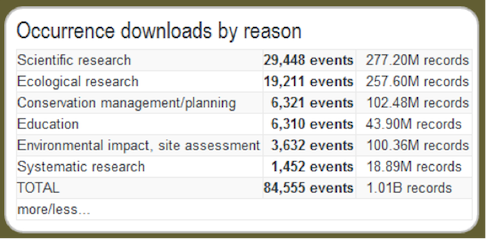The following article first appeared on the Atlas of Living Australia website.
One billion downloads and beyond

As part of research into refuges for biodiversity as climates change, the Australian National University’s Dan Rosauer looked at the diversity of lizards in eastern Australia’s rainforests.
“Using the Atlas, I was able to download records of relevant groups of lizards across eastern Australia,” Dan says. “The records were primarily what are known as vouchered specimens held in museum collections. It took me around half an hour, compared with the weeks and months I spent getting hold of similar records when I was researching frogs as part of my PhD around eight years ago.
“The Atlas is great because it lets us focus on the research question, instead of searching for and managing data. “And when we have data to share we know others will be able put it to good use.”
Reaching one billion downloads represents a major increase in usage of the Atlas, with an average of over 60 million records per month downloaded over the last six months. It shows that the Atlas is being used by an increasingly wide stakeholder community for a variety of research and applied outcomes.
“This is truly a remarkable achievement in data sharing,” says Ross Wilkinson from the Australian National Data Service. “The Atlas is an example of data re-use on a grand scale and shows the value of government investment in collaborative research infrastructure”.
Inspiring uses of Atlas can be seen among the Spatial Portal Case Studies, <http://www.ala.org.au/faq/spatial-portal/spatial-portal-case-studies/> including how to find the best location in Australia to produce your favourite wine, and how to choose a windfarm site that minimises harm to local bird and bat populations.
The Atlas of Living Australia is a partnership between CSIRO, Australia’s museums and herbaria, biological collections, research organisations, universities and government departments and is built on open source data and infrastructure.
Save the date, the Atlas of Living Australia’s annual Science Symposium <http://www.ala.org.au/blogs-news/save-the-date-atlas-of-living-australia-science-symposium-june-2014/> will be held on 11-12 June 2014 in Canberra.

